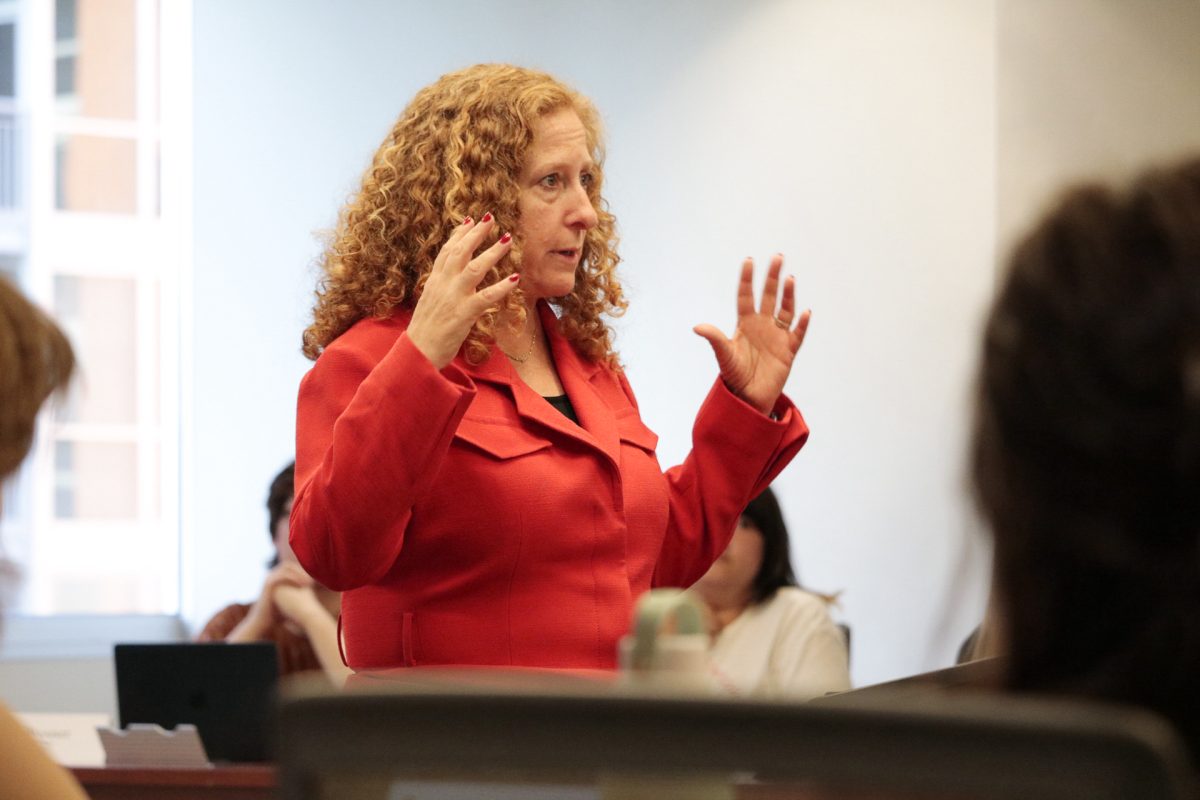After the University of Wisconsin System Board of Regents passed a new freshman admissions policy last month, college admissions has come under increasing scrutiny in the state of Wisconsin. Since May 2006, when the Board of Regents announced they would consider revising the freshman admissions policy to include non-academic factors including race, the regents have come under fire from some state lawmakers and civil activists. Despite the criticism, the regents approved a new "holistic" approach to freshman admissions Feb. 9, allowing factors such as socioeconomic status, race and extracurricular activities to play into the admissions decisions, in addition to students' academic records. The board argued that the freshman admissions policy does not violate Wisconsin state law since it complies with a 2003 Supreme Court ruling that allowed the University of Michigan to include race as an admissions factor. The new admissions policy — which has already been in place at UW-Madison for the past 12 years — has received so much attention recently that high school guidance counselors across the country began to question whether or not admissions criteria for UW were actually changing. However, guidance counselors from schools across the United States said that, despite the hype about the UW System admissions policy, not much has changed, adding that students are still just as eager to apply to UW this year as they have been in past years. However, with the number of students attending college continually on the rise, guidance counselors said competitive schools like UW are becoming increasingly more difficult to get into. "Things are getting very difficult all around," said Art Mandel, director of guidance at Roslyn High School in Long Island, N.Y. "More kids are graduating, and colleges are not increasing the number of students they accept. Mandel said the "bar" — the standard applicants have to meet to get into colleges like UW — is being raised nationally, making it more difficult to advise students. With greater supply but stagnant demand, admissions officers and guidance counselors across the nation said no one is certain about the exact formula students need to get into UW, since a formula simply does not exist. However, what is known is that UW is becoming more and more selective. The academic and extracurricular standards a student needs to have to get into UW continue to increase, according to every guidance counselor surveyed by The Badger Herald. Stop 1: The University of Wisconsin-Madison Admissions Office UW admissions officers said the standards for admitting students have been "business-like" for a while, adding the "new" UW admissions policy is nothing new in Madison. Thomas Reason, associate director of admissions at UW, said this year — like every year — there is no specific equation to get into UW. Besides grade point average and ACT scores, Reason said the university expects students to be significantly involved in extracurricular activities. "When students are not involved or minimally involved, it has a negative impact in terms of their application," Reason said. "Exceptional involvement might have a benefit." In the eyes of admissions officers, Reason said there is nothing that says being captain of the soccer team is "better" than having the lead in the spring play. Both of these things, he added, are important, and both activities would be considered similarly. Students who are good candidates for UW, Reason said, have no better chance of getting into Madison based on geographical location. "Other than whether or not they come from in or out of state, [location] has no difference on admissions decisions," Reason said. Although the admissions standards for this year are not different, Reason said the only significant change this year is the number of applications for the fall 2007 freshman class, which is up by more than 2,000 applications. "Application numbers are up, but admit numbers are not," Reason said. "Size of the freshman class remains static, because you do not have any more resources to admit more students." Consequently, Reason said 2,000 more students were denied this year than last, and he added the incoming class will certainly be as strong of a freshman class as last year, if not better. Stop 2: In-state high schools With UW right in the backyard of most students at Madison East High School, it is hard to ignore the competitive standards of the university, according to Kim Gary, who has been a guidance counselor at Madison East for the past 12 years. Gary said students who grow up in Madison experience the tradition, pride and "Badger-mania" many applicants only get a taste of when considering UW as a viable choice for college. The problem, Gary said, is that it is hard to provide an answer when students ask specifically what they "need" to get into UW. Gary said she normally tells people they should take four classes of each academic discipline — including Advanced Placement classes and "tag classes" that are part of a gifted and talented curriculum — a minimum score of 27 on the ACT, and involvement in extracurricular activities. Popular activities students participate in, she added, are sports, band, drama, clubs and community service. After years of experience as a high school guidance counselor, Gary estimated 56 percent of Madison East students go on to a four-year college and 17 percent move to a two-year college. However, in last year's class alone, Gary said it was hard to compare students to one another since no one knew for sure whether a particular student would get in to UW or not. "While this might be inaccurate, it feels like that sometimes admissions standards are the same except with kids from different race and ethnic backgrounds," Gary said. Overall, Gary said it would be nice if the process would get simpler rather than more complicated. But with 5,000 colleges in the United States to choose from, Gary said there are a lot of "pieces to [the] puzzle" of admissions. In a similar situation as Madison East High School, Milwaukee-area high schools Rufus King and Whitefish Bay are well aware of the difficulties for students applying to UW. According to David Forecki, guidance director at Rufus King, where 95 percent of last year's graduating class attended college, to get into Madison, students need a grade point average of at least 3.5. He said students also need a rigorous academic program of International Baccalaureate and AP classes, a minimum ACT score of a 29 and leadership roles — whether as a team captain or student government officer. "Yes, Madison is the hardest in the state," Forecki said. "It is competitive, and students need to be aware of that." Of any given graduating class, Forecki said it would most likely be only the top 20 percent that would get into UW. Curt Cattanach, school and college counselor at Whitefish Bay, said UW does require students to take a rigorous curriculum and perform well on the ACT. Five years ago, Cattanach said he was concerned with getting students into Madison after White Fish Bay eliminated class rank, despite having 94 percent of its student body attend college. Cattanach said the holistic review is beneficial to their students in case they miss out by only one point of reaching the necessary class rank. "My hope," Cattanach said, "is [the admissions offices] look at a variety of different factors." In addition, UW is even more competitive in this area, Cattanach said, because it has an excellent reputation with many programs and majors and is also, most importantly, relatively affordable. Just west of Wisconsin is the other group of "resident" students who benefit from reciprocity. Yet for these students, UW is still extremely competitive, according to Gay Ludvig, guidance counselor at Eden Prairie High School. Out of the 800 students who graduate from Eden Prairie every year, Ludvig said 40 apply to UW-Madison. "There is no one formula to get in," Ludvig said. "Students need to bring strong grades, high ACT scores and exceptional talents in athletics and leadership." Ludwig said students who apply to UW are extremely competitive and are also applying to other competitive institutions as well. Still, Ludvig added there has been an increase in the number of applications because of the economics. "It is an excellent school for the money," Ludvig said. "Students also like the idea of successful athletic teams and the town environment of the campus." Stop 3: Out-of-state high schools To conclude the Midwestern tour of high schools, it is necessary to stop in the suburbs of Chicago, where a significant portion of the UW student population hails from. Sue Biemeret, a college consultant at Adlai E. Stevenson High School in Lincolnshire, Ill., said to get into UW, out-of-state students must have an A average with AP classes. With much attention being given to the "holistic" factors in the admission's decision, Biemeret said, "I do not perceive that having special talents is going to override academics." Stevenson, as one of the most competitive high schools in the country, offers 32 out of the 34 classes offered by AP. Just last year, Biemeret said, Stevenson had 180 students apply to UW out of a graduating class of 1,100. Out of the 180, she said 116 students were accepted. "Besides having great programs as well, the truth is, students want to go to UW because it is not Illinois and does not have too many Illinoisans," Biemeret said. With fewer state universities on the East Coast, UW remains a popular destination among high school applicants looking for the "big-time" college experience. In Long Island, N.Y., Roslyn High School continues to receive high national rankings with a large percentage of the senior class attending competitive four-year colleges. Mandel said students who have recently been accepted to UW have a grade point average of 3.2-3.3 and score a 1250 on the old scale for the SATs, but are also extremely involved students. This year alone, Mandel said 37 students sent applications to UW out of a class of 272, with seven being accepted to date. "[Roslyn High School is] on the radar in Wisconsin," Mandel said. "It is a hot school for our students, who are often looking for a Big Ten experience similar to competitors like Michigan, Maryland and Penn State. Very few schools fall into that category." Right outside the nation's capital in Maryland, Winston Churchill High School students also apply to UW often. According to Luana Zimmerman, college and career information coordinator at Churchill, the mean SAT score for Churchill students is 1825 on a 2400 scale, versus the national mean of 1518. Consequently, students from Churchill frequently apply to UW. However, Zimmerman added it is a reach for some students. "The 'challenge' or selectivity is specific to the student and his credentials," Zimmerman said. "In advising our students, we first look at the published standardized test score ranges and GPA and academic subject requirements published by the UW-Madison Office of Admissions." In 2005, Zimmerman said out of a class of 483 seniors, 32 students applied to UW, 29 were admitted and 12 enrolled. Last year, 47 students applied to UW out of 541 seniors, and 20 were admitted, but only one enrolled. On the opposite coast, at Calabasas High School, in Calabasas, Calif., college and career advisor Susan Weissman said students should have at least a B+ average to apply to UW. "We always have students applying to Madison," Weissman said. "Students need a strong college curriculum — what we would expect for students who apply to the University of California." Despite the number of students who apply, Weissman said students like the size and opportunity UW has to offer, especially the active student body. "Students here are very involved with music and performing arts programs and do anywhere from 25 to 100 hours of community service per year," Weissman said. "[Students] here are very engaged — that's why they are attracted to a school like Wisconsin." Stop 4: What do we tell students who want to go to UW? With the end of the year approaching, the UW Admissions Office is mailing out final decisions and students are deciding whether or not to enroll at UW. Statistics for the incoming freshman class will not be released until later this spring. No one is certain yet if the UW's systemwide admissions policy will have any effect on the applicants of the incoming freshman class, even though the criteria for admission has already been in place for the past 12 years. Guidance counselors believe the new systemwide admissions policy did not deter students from applying, but rather elevated the national status of the UW System, and specifically its flagship campus. UW is the dream school for many, according to advisors and admissions counselors, and the university will never release a set formula that can computerize college admissions. For now, counselors said they can only guess as to what it takes to get into UW, because no one will ever be certain.
In-Depth: Getting accepted at UW
March 28, 2007
Advertisements
0
Donate to The Badger Herald
Your donation will support the student journalists of University of Wisconsin-Madison. Your contribution will allow us to purchase equipment and cover our annual website hosting costs.
More to Discover












